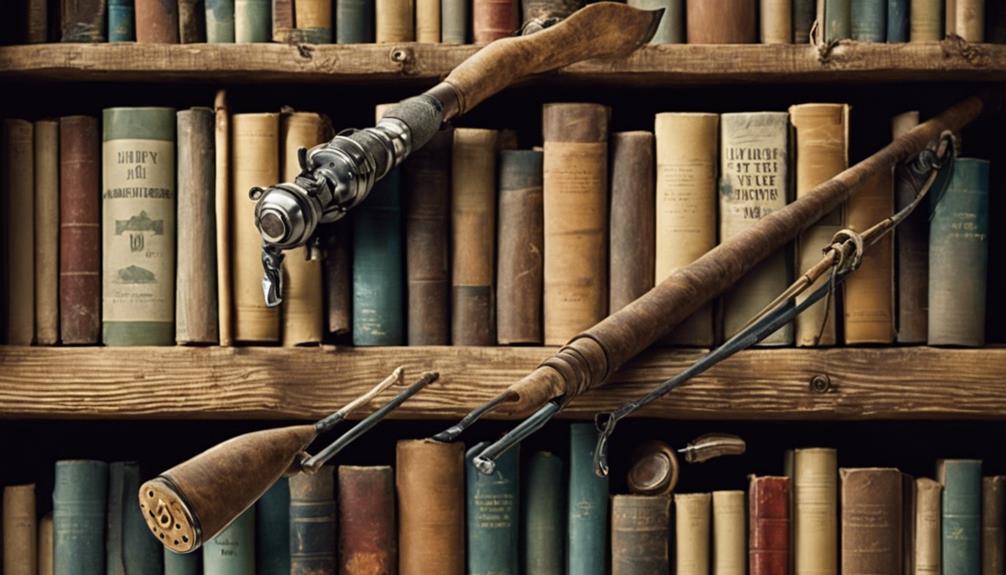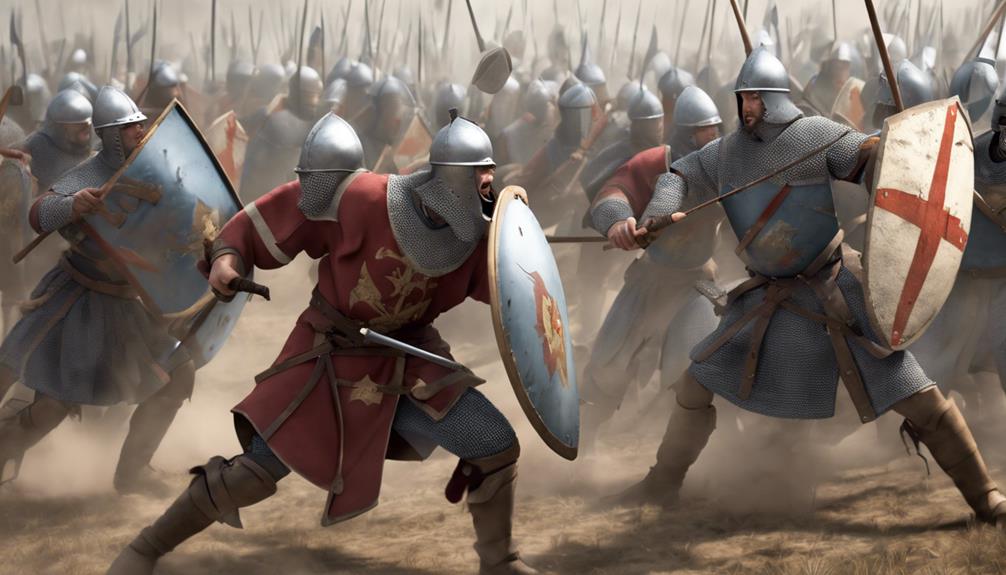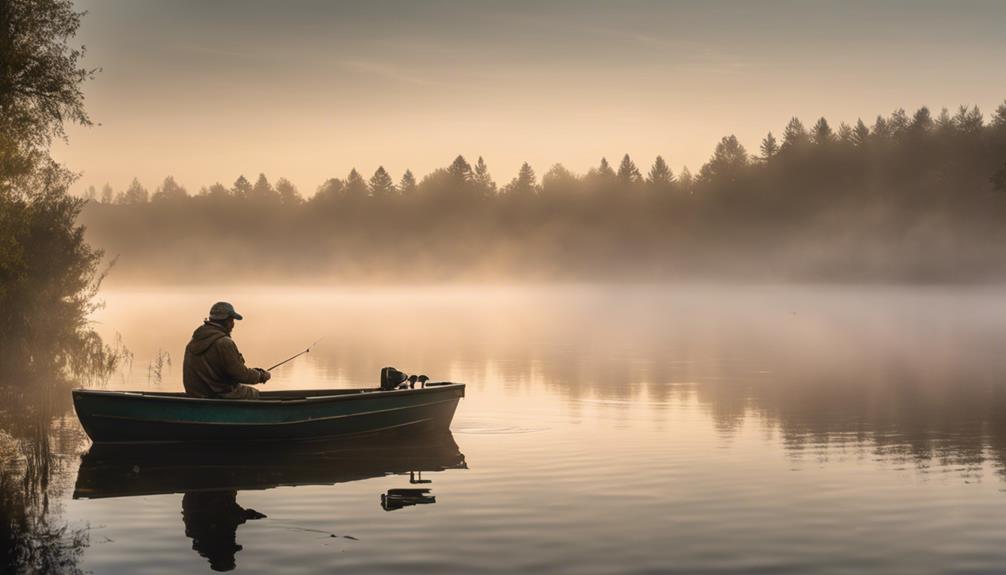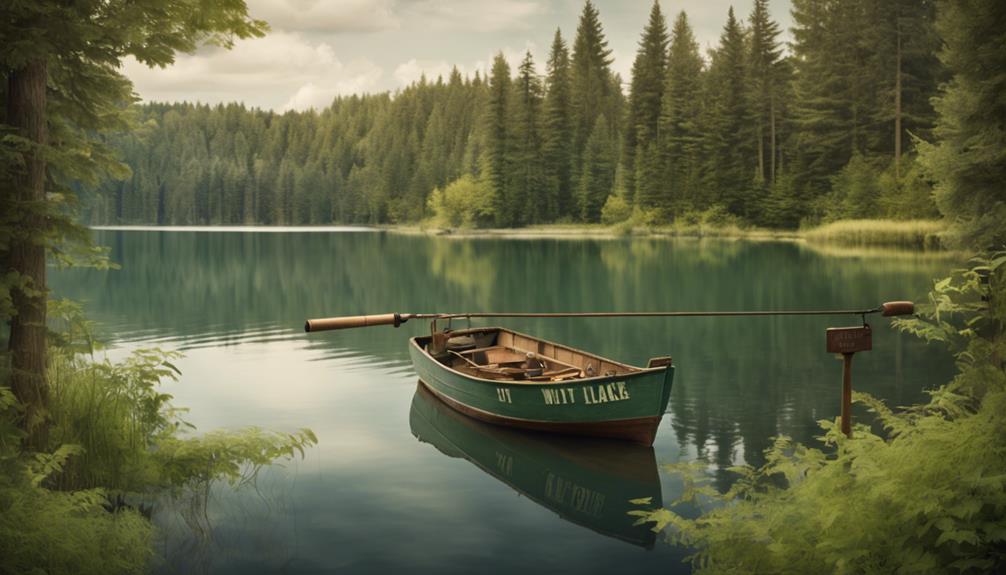As you contemplate the serene beauty of nature in classic American literature, have you ever noticed the subtle yet significant presence of angling woven into the fabric of these timeless tales?
From the tranquil waters of Walden Pond to the thrilling struggles against marlin in the Gulf Stream, angling has left its mark on some of the most revered works in literary history.
But what deeper connections lie beneath the surface of these narratives, waiting to be unraveled and explored further?
Early Angling References in American Literature
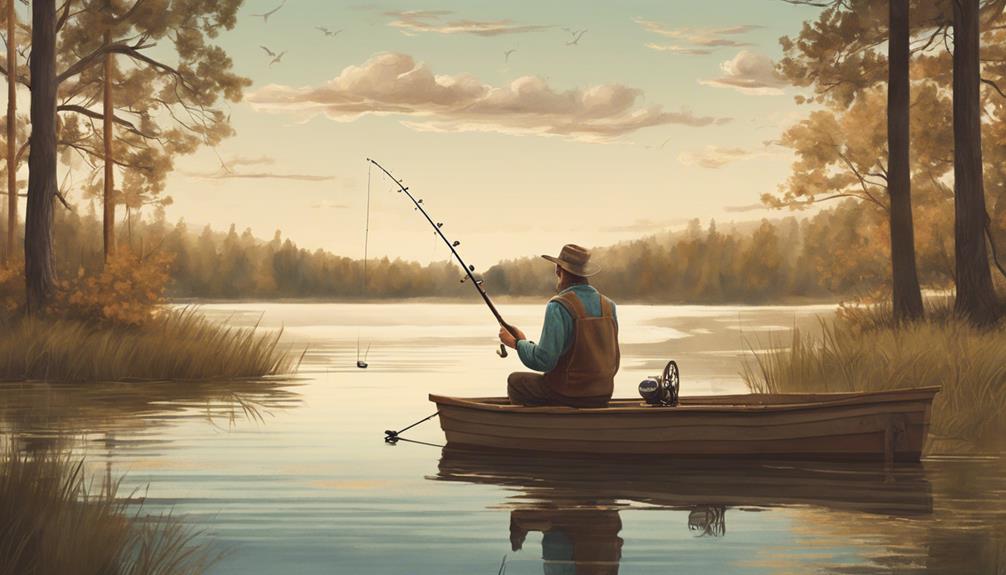
Explore how early American writers often subtly incorporated angling into their works, adding depth to their narratives and character development. Angling, with its origins rooted in ancient civilizations like Egypt and China, gradually made its way into American literature, influencing writers to weave this art of fishing into their stories.
The literary influences of angling can be seen in works such as Washington Irving's 'The Legend of Sleepy Hollow,' where the protagonist, Ichabod Crane, is described as enjoying the tranquility of the riverbanks while fishing. This subtle inclusion of angling not only sets the scene but also provides insight into Crane's character, showcasing his contemplative and patient nature.
In James Fenimore Cooper's 'The Last of the Mohicans,' the act of fishing serves as a metaphor for survival and adaptability in the wilderness. By incorporating angling into his narrative, Cooper adds layers of symbolism to the characters' actions, deepening the reader's understanding of their struggles and strengths.
These early American writers masterfully used angling as a tool to enhance their storytelling, creating richer and more nuanced characters and environments for their readers to explore.
Thoreau's Influence on Angling Literature
Thoreau's contemplative approach to angling permeates through American literary classics, shaping the portrayal of nature and introspection in angling literature. Thoreau's philosophy, deeply rooted in his connection to nature, influenced how angling was depicted in literature, emphasizing not just the act of fishing but the spiritual and reflective aspects of the experience. As a reader, you can almost feel the tranquility of a secluded fishing spot and the profound connection with the natural world when delving into angling narratives inspired by Thoreau.
- Thoreau's emphasis on simplicity and mindfulness while angling echoes in the serene descriptions of fishing scenes.
- The introspective nature of Thoreau's philosophy is mirrored in the internal dialogues and self-discoveries of angling characters.
- Thoreau's belief in the importance of solitude in nature is evident in the solitary angling expeditions depicted in literature.
- The reverence for the environment and the interconnectedness of all living beings, central to Thoreau's teachings, underpins the conservationist themes in angling stories.
Through Thoreau's influence, angling literature transcends mere fish tales, evolving into narratives that delve into the deeper connection between humans and the natural world, inviting readers to contemplate their place within the intricate tapestry of nature.
Hemingway's Depiction of Angling Adventures
Hemingway masterfully captures the thrill and challenges of angling adventures in his literary works. His stories often delve into the theme of man vs. nature, portraying intense survival tales where characters must confront the raw power of the natural world while testing their own limits. Hemingway's depiction of angling isn't merely about catching fish; it symbolizes the inner strength and resilience needed to navigate life's obstacles.
In many of his works, angling is portrayed as more than just a physical activity; it becomes a metaphor for the struggles and triumphs of the human experience. The angling adventures in Hemingway's stories are romanticized, filled with moments of quiet reflection amidst the chaos of the natural world. Through his writing, he captures the essence of the angler's journey, the solitude, the connection to nature, and the thrill of the chase.
Hemingway's characters often find solace and meaning in the simplicity of angling, using it as a way to contemplate life's deeper questions. The quiet moments by the water, the struggle to reel in a catch, and the satisfaction of a successful day on the river all contribute to the richness of his narratives. Hemingway's angling adventures aren't just about fishing; they're about the human spirit and our eternal quest for meaning in a vast and unpredictable world.
Angling Symbolism in Moby Dick
In Moby Dick, angling symbolism takes on a profound and multifaceted role, intertwining themes of obsession, fate, and the relentless pursuit of an enigmatic quarry. The symbolic interpretations of marine life in Herman Melville's masterpiece provide a rich tapestry for readers to unravel, delving into the depths of human nature and the mysteries of the sea.
- Symbolic Interpretations: Melville uses the act of angling and the pursuit of the white whale, Moby Dick, to symbolize the complexities of life, fate, and the unknowable aspects of existence.
- Marine Life Symbolism: The various marine creatures encountered during the characters' voyage serve as metaphors for different aspects of the human experience, reflecting both the beauty and the dangers of the natural world.
- Character Development: Through the lens of angling symbolism, readers witness the transformation of Captain Ahab, whose obsession with hunting Moby Dick drives him to the brink of madness and self-destruction.
- Ahab's Obsession: The relentless pursuit of the white whale becomes a metaphor for Ahab's all-consuming desire for vengeance, highlighting the destructive power of unchecked ambition and hubris.
Melville's intricate use of angling symbolism in Moby Dick elevates the novel beyond a mere tale of whaling to a timeless exploration of human nature, destiny, and the eternal struggle between man and the unknown.
Regional Angling Traditions in Fiction
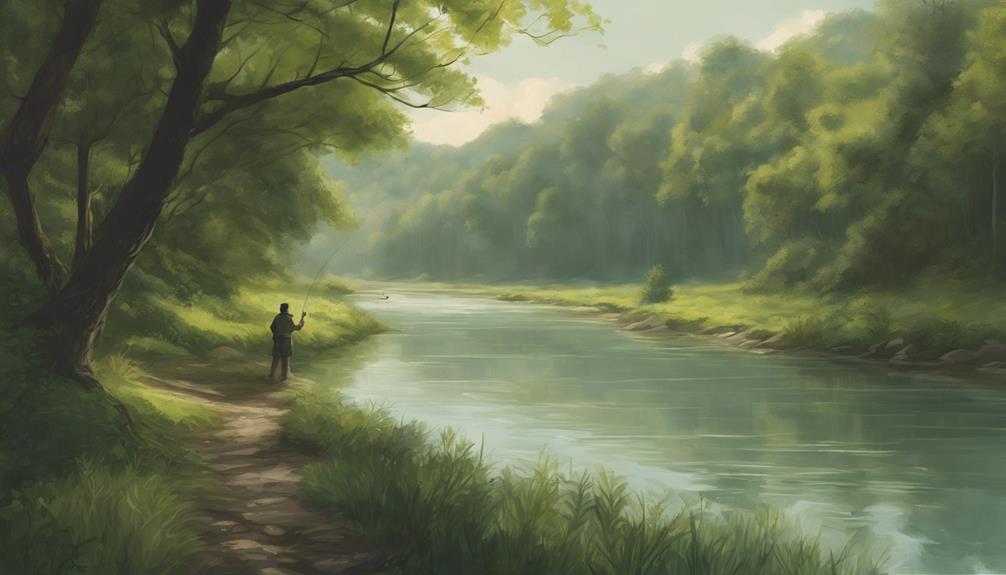
Exploring various regional angling traditions in fiction unveils a diverse tapestry of cultural practices and storytelling motifs. In literature, regional angling traditions often play a crucial role in character development, shaping the personalities and backgrounds of protagonists and supporting characters alike. Through the act of fishing, authors can delve into the intricacies of their characters, showcasing their patience, perseverance, and connection to nature.
Moreover, these traditions shed light on the environmental impact of angling within specific regions. Whether set by a serene mountain stream or a bustling urban river, the depiction of angling practices in fiction can highlight the delicate balance between human activity and the natural world. Descriptions of polluted waters, overfished lakes, or pristine landscapes teeming with aquatic life provide readers with insight into the consequences of human actions on the environment.
Gender Dynamics in Angling Narratives
Delving into angling narratives, one can discern nuanced gender dynamics shaping characters' relationships with fishing and the natural world. In these literary classics, power dynamics and social constructs play a significant role in portraying how men and women interact with the activity of angling.
- Traditional Gender Roles: Many angling narratives reflect traditional gender roles, where men are often depicted as the active anglers, showcasing strength and dominance, while women are portrayed in more passive roles, such as enjoying the tranquility of nature by the water.
- Challenging Stereotypes: Some stories challenge these stereotypes, featuring women who defy societal expectations by excelling in the art of angling, breaking free from the constraints of traditional gender norms.
- Bonding Opportunities: Angling narratives often present fishing as a bonding activity between characters, regardless of gender, emphasizing the shared experiences and connections forged amidst the natural world.
- Exploration of Masculinity: Through angling, male characters may explore their masculinity, seeking validation and a sense of accomplishment in their ability to conquer nature, reflecting deeper insights into societal views on manhood and power dynamics.
These gender dynamics in angling narratives offer a lens through which to examine broader themes of identity, relationships, and societal expectations, adding depth and complexity to the portrayal of characters in American literary classics.
Conservation Themes in Angling Classics
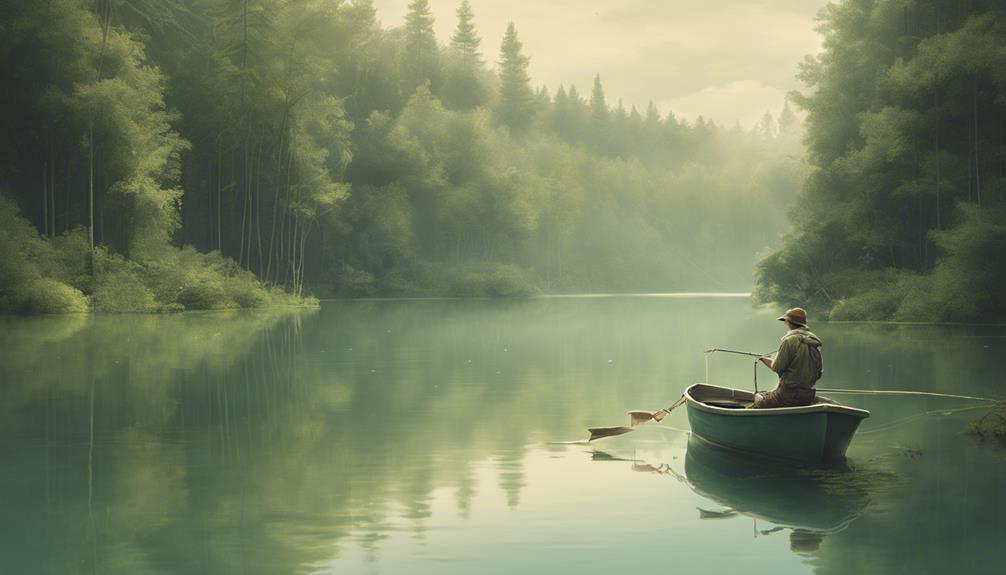
Amidst the angling classics, conservation themes resonate as vital components shaping the narrative landscapes. In these timeless tales, the importance of environmental ethics, sustainability, natural resource management, and stewardship is intricately woven into the fabric of the angling experience.
Authors of angling classics often use their narratives to highlight the delicate balance that exists in nature and the responsibilities that come with enjoying its bounties. Through the characters' interactions with the environment, readers are reminded of the interconnectedness of all living things and the impact of human actions on ecosystems. The concept of stewardship, where individuals are entrusted with the care of the natural world, shines through in these works, emphasizing the need for responsible angling practices that ensure the preservation of aquatic habitats and species for future generations.
These literary classics serve as poignant reminders of the fragility of the natural world and the importance of adopting a mindset of conservation in all angling pursuits. By championing sustainable fishing practices and advocating for the protection of waterways, these works inspire readers to become stewards of the environment, fostering a deep appreciation for the beauty and richness of the ecosystems that support angling adventures.
Modern Angling Perspectives in Literature
In modern literature, angling perspectives have evolved to reflect contemporary environmental concerns and shifting societal values surrounding conservation. Anglers and writers today are more cognizant of the environmental impact of their actions and the ethical dilemmas that come with pursuing the sport.
- Exploration of Sustainable Practices: Modern angling literature often delves into discussions on sustainable fishing practices, emphasizing the importance of responsible angling to preserve aquatic ecosystems for future generations.
- Ethical Considerations: Authors now frequently tackle the ethical dilemmas surrounding catch-and-release fishing, questioning the potential stress and harm caused to fish despite good intentions.
- Human-Nature Relationships: Contemporary angling narratives explore the intricate relationship between humans and nature, highlighting the interconnectedness of all living beings in the ecosystem.
- Call for Conservation Action: Many modern angling works serve as a call to action for conservation efforts, urging anglers to become stewards of the environment and protect vulnerable aquatic habitats.
Through these evolving perspectives, modern angling literature serves not only as a source of entertainment but also as a platform for reflection on the delicate balance between human recreation and environmental preservation.
Frequently Asked Questions
How Has the Portrayal of Angling in American Literature Evolved Over Time?
When it comes to the portrayal of angling in American literature, it has evolved significantly over time. From early simplistic views to more complex and nuanced depictions, the evolution of angling in literary works mirrors society's changing perspectives on nature, leisure, and the outdoors.
Literary influences have played a crucial role in shaping these portrayals, offering readers a deeper understanding of the art and craft of angling through the lens of different writers and time periods.
Are There Any Lesser-Known Angling References in Classic American Literature That Have Been Overlooked?
You might be surprised at the hidden references to angling in classic American literature that have been overlooked.
A deeper literary analysis can reveal subtle mentions of fishing in works that aren't typically associated with the sport.
These hidden references provide a new perspective on the role of angling in American literary classics and showcase the diverse ways in which this pastime has been woven into the fabric of our literary heritage.
How Do Different Regional Angling Traditions Influence the Way Fishing Is Depicted in Fiction?
Regional influences play a significant role in shaping the depiction of fishing in fiction. Different angling traditions from various areas bring unique cultural perspectives to the narrative. These traditions can influence how characters interact with nature, the symbolism attached to certain fish species, and even the rituals surrounding fishing practices.
What Role Do Women Play in Angling Narratives, and How Has This Changed Over the Years?
When it comes to angling narratives, exploring gender dynamics is crucial.
Over the years, perspectives on the role of women in these stories have evolved. Initially, women may have been portrayed in supporting roles, but now they're often depicted as skilled anglers in their own right.
This shift reflects changing societal norms and a growing recognition of women's contributions to the angling world.
In What Ways Do Modern Angling Perspectives in Literature Differ From Those in Classic Angling Classics?
In modern angling perspectives, you'll notice a shift away from the traditional influences found in classic angling classics. Today's literature often explores angling in a more diverse and inclusive way, reflecting a broader range of voices and experiences.
While classic works may have focused more on specific techniques and male-dominated narratives, modern writings tend to embrace a wider array of themes and characters, offering a fresh and contemporary take on the angling experience.
Conclusion
You've journeyed through the rich history of angling in American literature, from early references to modern perspectives.
You've seen how Thoreau, Hemingway, and others have shaped angling narratives with themes of adventure, symbolism, and conservation.
As you reflect on the impact of angling in these literary classics, you realize the enduring connection between nature, storytelling, and the art of angling itself.
Keep exploring the depths of angling literature and its timeless influence on American culture.
